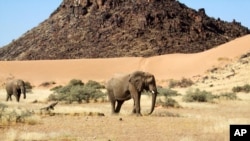Namibia has defended its sale of 22 wild elephants to a zoo in the United Arab Emirates as legal and needed to prevent human-wildlife conflict. But conservationists call it a legal loophole and excuse to make money.
The chief of Namibia’s Ministry of Environment, Forestry and Tourism described the sale as a private transaction, between buyer and seller, which could not be influenced by the Namibian government.
Speaking at a press briefing Wednesday, Teofilus Nghitila said the transaction is lawful and in accordance with CITES, the Convention on International Trade in Endangered Species of Wild Fauna and Flora.
“I have indicated earlier that these live sales of these African elephants fulfill Article Three of the CITES, and making reference to that article, it set procedures that need to be followed and the responsible authority have to cross check and also in consultation with the CITES Secretariat, that that requirement is fulfilled. So, we have not received any opposition for the CITES at this stage and that means the condition is fulfilled," said Nghitila.
Michele Pickover is executive director of an animal welfare group, the EMS Foundation. She told VOA that Namibian authorities are being disingenuous by citing Article Three of the CITES, which deals with the export of endangered species from their natural habitats.
“O.K. that I think would be Namibia seeing Article Three as a loophole. Article Three is essentially around Trade in Appendix One animals, but elephants from Namibia are actually Appendix Two animals since 1996, they are seen as Appendix Two elephants,” she said.
Pickover further said a legal opinion from the foundation's attorneys said the transaction is illegal and that the main motivating factor for the export of the elephants is not to manage human wildlife conflict but to make a profit.
“I also think one has to look at the money. There are a lot of players here that are making a lot of money. Namibia claims that they made 5.9 million rand [$390,580] or 5.7 million rand [$377,340]. We’ve heard something like fifty million rand [$3.3 million]. Traders and other individuals from South Africa and so on. So, you know there is big money here and where there is big money all sorts of bad things happen,” she said.
The Namibian government cites human-wildlife conflict as the reason for the need to decrease the population of elephant herds. Elephants are blamed for the deaths of four people in Namibia and the trampling of hundreds of small farmers’ crops.
Animal welfare groups bemoan the fact that these elephants are not being moved to African parks and ranges, as called for by international conventions, and instead are being sold into captivity.




